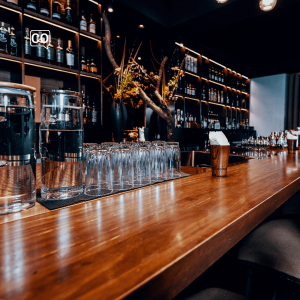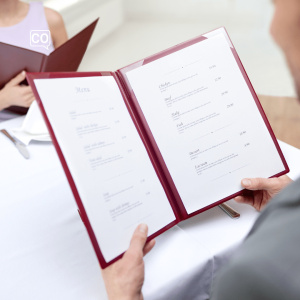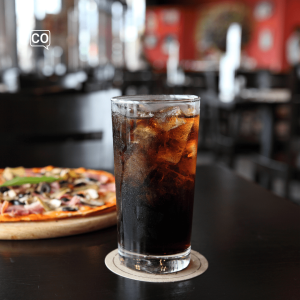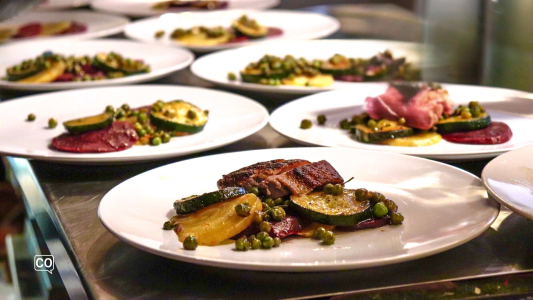Pedir comida y comer fuera

Learning goals:
- Tener conversaciones básicas en un restaurante (Have basic conversations in a restaurant)
- Reserva una mesa y pide algo del menú (Reserve a table and order something from the menu)
-
"Haber" + participio (el pretérito perfecto) ("Haber" + participio (el pretérito perfecto)) - Ferran Adrià y el restaurante "El Bulli" (Ferran Adrià and the restaurant El Bulli)
Learning module 6 (A1): La ciudad y el pueblo (The city and the village)
Recap exercises of the previous lesson
Teaching guidelines +/- 60 minutes
Core vocabulary (10)
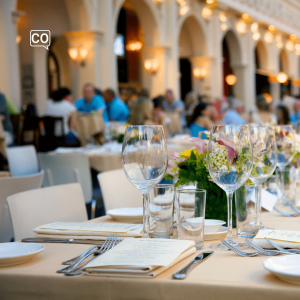
He tomado una bebida en el restaurante.
(I have had a drink in the restaurant.)
El restaurante
(The restaurant)
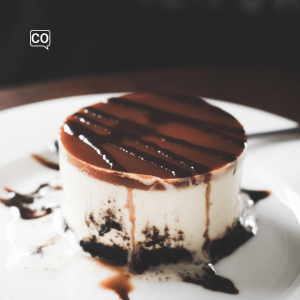
He pedido el postre en el restaurante.
(I have ordered the dessert in the restaurant.)
El postre
(The dessert)
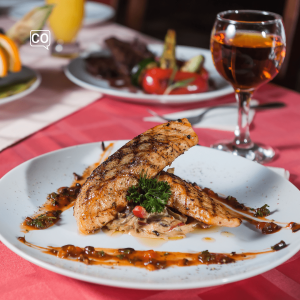
El camarero ha traído el plato a la mesa.
(The waiter has brought the plate to the table.)
El plato
(The plate)
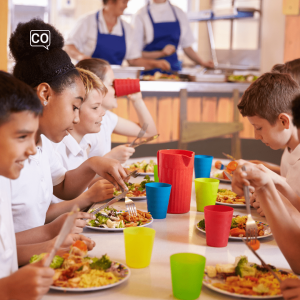
He probado un café en la cafetería, ¡está delicioso!
(I tried a coffee at the café, it's delicious!)
La cafetería
(The café)
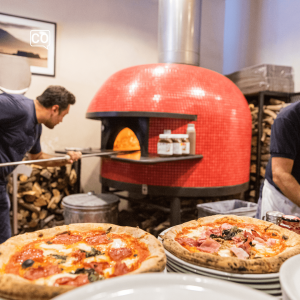
He reservado una mesa en la pizzería.
(I have reserved a table at the pizzeria.)
La pizzería
(The pizzeria)
Listening materials
Our listening materials implement the verbs, vocabulary and grammar topics of this lesson. Audio and video available!
A1.39.1 Diálogo: ¿Qué te ha parecido la comida?
Spanish A1.39.1 What did you think of the food?
Una conversación básica entre Pedro y Ana que comen en un restaurente y hablan sobre la comida y el servicio.
(A basic conversation between Pedro and Ana who are eating in a restaurant and talking about the food and the service.)
Teaching guidelines +/- 15 minutes
A1.39.2 Gramática: "Haber" + participio (el pretérito perfecto)
Spanish A1.39.2 "Haber" + participio (el pretérito perfecto)
(Brief explanation of the grammatical topic "haber + participio" (el pretérito perfecto).)
Teaching guidelines +/- 15 minutes
A1.39.3 Cuento corto: Reservar una mesa y pedir en un restaurante
Spanish A1.39.3 Booking a Table and Ordering at a Restaurant
Ana y Pedro reservan una mesa en una pizzería y van a cenar fuera.
(Ana and Pedro reserve a table at a pizzeria and go out for dinner.)
Teaching guidelines +/- 15 minutes
A1.39.4 Cultura: Ferran Adrià y el restaurante "El Bulli"
Spanish A1.39.4 Ferran Adrià and the restaurant El Bulli
Ferran Adrià revolucionó la cocina en El Bulli con creatividad y técnicas innovadoras. El Bulli era el mejor restaurante del mundo.
(Ferran Adrià revolutionised the cooking at El Bulli with creativity and innovative techniques. El Bulli was the best restaurant in the world.)
Teaching guidelines +/- 10 minutes
Exercises
These exercises can be done together during conversation lessons or as homework.
Exercise 1: Find the words
Instruction: Find the words, mark them and make sentences with the words.
Show answers Show hintsHints
To take , The waiter , The drink , The plate , The menu , The pizzeria
Answers
Score: 0/6
| El plato | (The plate) |
| La pizzería | (The pizzeria) |
| El camarero | (The waiter) |
| El menú | (The menu) |
| Tomar | (To take) |
| La bebida | (The drink) |
Exercise 2: Reorder sentences
Instruction: The words in these sentences have been shuffled! Sort them so that they make a valid sentence again and translate.
Show answers Show translationExercise 3: Translate and make sentences
Instruction: Translate the words and phrases below and use it in a conversation or text.
Show answersExercise 4: Translate and use in a sentence
Instruction: Translate and say the word out loud. Use the word in a sentence.
Show translation|
1.
Tomar
|
(To take) |
|
2.
El bar
|
(The pub) |
|
3.
El plato
|
(The plate) |
|
4.
La bebida
|
(The drink) |
|
5.
La pizzería
|
(The pizzeria) |
Exercise 5: Conjugación verbal
Instruction: Choose the correct word, read the sentence out loud and translate.
Show answers Show translationTrabajar (Pretérito perfecto, indicativo), Hablar (Pretérito perfecto, indicativo), Vivir (Pretérito perfecto, indicativo), Estudiar (Pretérito perfecto, indicativo), Beber (Pretérito perfecto, indicativo), Comer (Pretérito perfecto, indicativo)
1. Ellas ... en la oficina.
2. Ellos ... en la villa por muchos años.
3. Yo ... en esta casa.
4. Ellos ... los síntomas en el hospital.
5. Él ... en la escuela.
Exercise 6: "Haber" + participio (el pretérito perfecto)
Instruction: Choose the correct word, read the sentence out loud and translate.
Show answers Show translationhemos tomado, he tomado, han comido, ha comido, habéis tomado, han bebido, hemos bebido, has tomado
1. Beber: Ellos ... un zumo en la cafetería.
2. Comer: Ella ... un plato de pasta en el restaurante italiano.
3. Beber: Nosotras ... una bebida en el bar.
4. Tomar: Nosotros ... una bebida fría en la cafetería.
5. Tomar: Tú ... tu plato favorito en el restaurante.
6. Tomar: Vosotros ... el menú para leerlo.
7. Comer: Ellas ... un postre después de la cena.
8. Tomar: Yo ... un postre pequeño.
Exercise 7: Translate and make sentences
Instruction: Translate the words and phrases below and use it in a conversation or text.
Show answersAppendix 1: Extended vocabulary table
Core vocabulary
(10):
Verbs: 1,
Nouns: 9,
Context vocabulary:
11
| Spanish | English |
|---|---|
| Bebidas | Drinks |
| Camarera | Waitress |
| Camareros | Waiters |
| Chef | Chef |
| Cocina | Kitchen |
| El bar | The pub |
| El camarero | The waiter |
| El menú | The menu |
| El plato | The plate |
| El postre | The dessert |
| El restaurante | The restaurant |
| Ha tomado | Has had |
| La bebida | The drink |
| La cafetería | The café |
| La pizzería | The pizzeria |
| Pizza | Pizza |
| Platos | Dishes |
| Tomado | I have had |
| Tomar | Have |
| Tomarlo | Have it |
| Usado | Used |
Appendix 2: Verb conjugation tables for this lesson
Vivir (to live)
Exercises and examples phrases
- yo he vivido I have lived
- tú has vivido You have lived
- él/ella ha vivido he has lived
- nosotros/nosotras hemos vivido We have lived
- vosotros/vosotras habéis vivido You have lived
- ellos/ellas han vivido They have lived
Estudiar (to study)
Exercises and examples phrases
- yo he estudiado I have studied
- tú has estudiado You have studied
- él/ella ha estudiado he has studied
- nosotros/nosotras hemos estudiado we have studied
- vosotros/vosotras habéis estudiado You have studied
- ellos/ellas han estudiado They have studied
Trabajar (to work)
Exercises and examples phrases
- yo he trabajado I have worked
- tú has trabajado You have worked
- él/ella ha trabajado he has worked
- nosotros/nosotras hemos trabajado We have worked
- vosotros/vosotras habéis trabajado you all have worked
- ellos/ellas han trabajado They have worked
Beber (to drink)
Exercises and examples phrases
- yo he bebido I have drunk
- tú has bebido You have drunk
- él/ella ha bebido he has drunk
- nosotros/nosotras hemos bebido We have drunk
- vosotros/vosotras habéis bebido You have drunk
- ellos/ellas han bebido They have drunk
Comer (to eat)
Exercises and examples phrases
- yo he comido I have eaten
- tú has comido You have eaten
- él/ella ha comido He has eaten
- nosotros/nosotras hemos comido We have eaten
- vosotros/vosotras habéis comido you have eaten
- ellos/ellas han comido They have eaten
Hablar (to speak)
Exercises and examples phrases
- yo he hablado I have spoken
- tú has hablado You have spoken
- él/ella ha hablado He/she has spoken
- nosotros/nosotras hemos hablado we have spoken
- vosotros/vosotras habéis hablado You have spoken
- ellos/ellas han hablado They have spoken
Exercise: Verb conjugation
Instruction: Choose the correct word, read the sentence out loud and translate.
Show answers Show translationTrabajar (Pretérito perfecto, indicativo), Beber (Pretérito perfecto, indicativo), Comer (Pretérito perfecto, indicativo), Vivir (Pretérito perfecto, indicativo), Hablar (Pretérito perfecto, indicativo), Estudiar (Pretérito perfecto, indicativo)
1. Nosotras ... café en la oficina.
2. Yo ... un vaso de agua en la cafetería.
3. Vosotros ... en un albergue en francia, ¿verdad?
4. Vosotros ... en la estación de policía con el gerente.
5. Tú ... en la urbanización.
